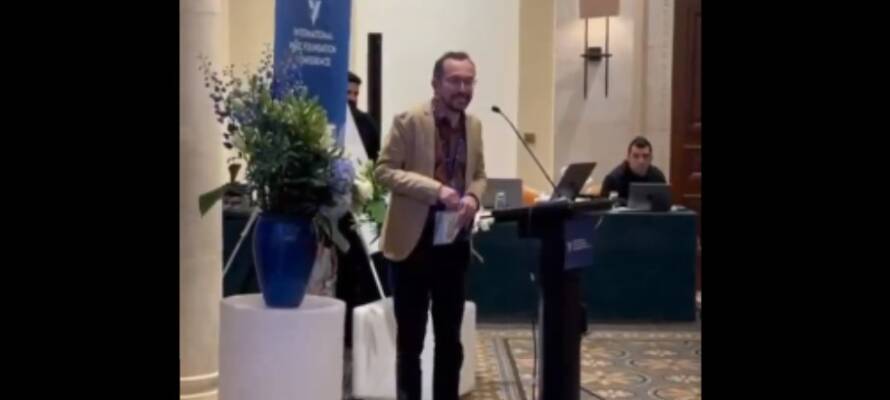The Yael Foundation currently supports 65 projects involving 10,000 children around the globe in 31 countries.
By Amelie Botbol, JNS
More than 100 Jewish school principals and leaders of Jewish educational projects converged at the International Yael Foundation Conference in Cyprus on Monday to discuss the future of Jewish education, especially in the aftermath of Hamas’s Oct. 7 massacre.
“It’s very special for us to run this conference in a time of war,” Eliezer Lesovoy, director of education at Yael Foundation, told JNS.
Due to logistical issues, uncertainties resulting from the ongoing Israel-Hamas war and the reluctance of many educators in the diaspora to leave their communities amid the surge of antisemitism and anti-Israeli attacks worldwide, the conference, which was originally scheduled in January, only kicked off this week.
“We could not cancel the issue of Jewish education because of the war. On the contrary, we felt a need to strengthen Jewish education,” said Lesovoy.
Lesovoy, a seasoned Jewish educator who moved to Israel from Ukraine in 2004, has been running Yael Foundation, co-founded by Uri Poliavich and his wife Yael, after whom the foundation is named, for the past three years.
“Uri did not grow up in a religious family and learned about Jewish education later in life. He made it his mission to enable as many Jewish children as possible to familiarize themselves with Jewish education and culture,” said Lesovoy.
“Uri’s goal is for every Jewish child to know the meaning of Shabbat, Torah, kashrut and the Jewish commandments,” he added.
The Yael Foundation currently supports 65 projects involving 10,000 children around the globe in 31 countries throughout Europe, South America, North America, North Africa and Asia-Pacific.
While this is only the conference’s second edition, this year attracted 70% more participants than last year.
Prior to the conference, Lesovoy’s team ran an online survey in which they asked 3,000 parents of pupils in Jewish schools supported by the Foundation worldwide whether the Oct. 7 terror attacks had strengthened or weakened their motivation to send their children to Jewish schools. Some 90% of those surveyed said the former.
“It shows that the parents of Jewish children already engaged in Jewish education projects will continue to send their children to Jewish school and will even motivate others to do the same,” Lesovoy told JNS.
“Those hesitating before the Oct. 7 attacks on whether they would continue to send their children to Jewish schools are much more confident” about doing so, he added.
Elodie Marciano, the founder of “Choose Jewish School” (“Choisir l’école Juive” in French) funded in part by the Foundation and which allows 1,000 kids to join Jewish educational institutions annually, also noted this new enthusiasm among Jewish parents in the aftermath of Hamas’s Oct. 7 terror attacks.
“Every year, we organize the ‘Salon des Ecoles Juives,’ an exhibition virtually every Jewish school in France and even overseas takes part in. This year, we had 1,200 visitors,” Marciano told JNS.
“Choose Jewish School” matches Jewish families with the Jewish educational institutions that fit their needs. The organization assists parents in choosing and signing up to a Jewish school. “Choose Jewish School” also provides scholarships to families in need to allow children access to Jewish education.
“There is a wish among Jewish parents to reinforce their Judaism and introduce their children to Jewish history. Since Oct. 7, we noted an increase of 20% in calls from parents inquiring about sending their children to Jewish schools, in comparison to last year,” added Marciano.
Beyond providing access to Jewish learning, Yael Foundation also aims to enable and motivate Jewish educational institutions to strive for academic excellence.
“While we don’t always know the skills that children will need in 10 years, we work on assembling an innovative toolkit for Jewish educators in a constantly evolving environment,” said Lesovoy.
“Our vision is to turn the profession of Jewish educator into a prestigious one. While we invest in tools and modern technology for proper education, we also work to ensure that Jewish educators are financially rewarded,” he added.
Amihai Bannett, CEO of Herzog Global at Herzog College, told JNS that post-Oct. 7, “Jewishness” has become increasingly important.
“When we woke up on Oct. 8, teachers around the world needed to prepare for the following day, Monday, when students would return to classrooms,” he said.
He recounted how a former lecturer and psychologist at Herzog College had recorded a short video on how to approach the war. After the Hamas attacks, the school incorporated into its lesson plan a story from the Hebrew Bible about King David and the Kingdom of Israel’s resilience.
“The stronger someone is in their Jewish identity, the greater their ability to answer antisemitic comments and the delegitimization of Israel,” said Bannett.
It was a busy day at the #YaelFoundation International Conference!
From Dr. Hananel Rozenberg who addressed the battle between smartphones in schools, to Dr. Tzahi Lev- Ran, who talked about parents who aren’t cooperative with their kids teachers.More to come… captivating… pic.twitter.com/OeUTX1Kl9x
— Yael Foundation (@YaelFoundation) February 19, 2024























